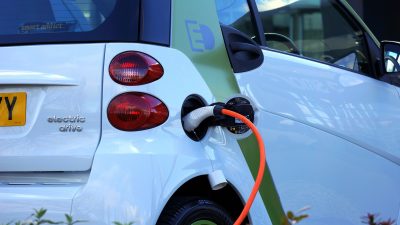Boston’s first income-tiered electric vehicle car-share program will soon launch in Roxbury.

E4TheFuture, a nonprofit that promotes clean energy, will lead the project with support from the City of Boston, Eversource, Metropolitan Area Planning Council, Shared Mobility Inc. and Nuestra Comunidad, according to a City press release.
It was partially funded by a $200,000 grant from the Massachusetts Clean Energy Center, according to Rachel Ackerman, a senior manager at MassCEC.
Susan Buchan, director of energy projects at E4TheFuture, said the program will help meet transportation needs when public options aren’t convenient.
“If you have a vehicle,” Buchan said, “it’s hard to understand how difficult it is, for instance, to take two children on a grocery shopping trip in February when it’s cold or snowing or to stand at the bus stop when you’re sick.”
The program is expected to launch before the end of the year, Buchan said. The grant covers four cars, and E4TheFuture hopes to add three or four more.
While the program is open to anyone, Buchan said a discounted rate is available to those who qualify for other low-income programs such as food stamps.
Buchan said users can access the cars for up to eight hours using a keyless entry system.
Ackerman said the program will reduce greenhouse gas emissions and the need for car ownership.
MassCEC is funding several programs with its Accelerating Clean Transportation Now initiative, including the Roxbury car-share program, according to Ackerman. The Center will track the projects’ emissions and economic viability to see if they can be implemented elsewhere.
“As these projects get off the ground over the next two years and are implemented,” Ackerman said, “those lessons learned can then be turned around pretty quickly and hopefully occur throughout the state.”
Megan Aki, an energy analyst at MAPC, said she hopes the car-share program will last beyond when initial seed funds run out.
“We think that the structure they’ve come up with provides a really unique opportunity,” Aki said, “to be able to test out how we can figure this out in a way that’s financially self sufficient.”
Aki said she’s interested in how an electric car-share program could work in suburban communities.
David Keith, a systems dynamics professor at the Massachusetts Institute of Technology, said project leaders will need to have enough vehicles for peak times.
“We all want cars at the same time,” Keith said, “when it’s a nice, sunny weekend day or going to the grocery store, after work.”
Drivers will need to learn how to use the car, Keith said, and understand they aren’t giving up car performance by driving an electric vehicle.
Sanjeev Mukerjee, a chemistry professor at Northeastern University, said the sharing economy has made temporary transportation cheaper and more efficient.
“Ten years ago, I would get down at an airport and rent a car, which was very inefficient,” Mujerkee said. “[Now], I just got an Uber, which works out cheaper, no hassles, no parking, etc.”
While ride- and car-share programs have made electric vehicles more accessible, most electric cars are still too expensive for lower-income individuals to purchase.
Battery prices must decrease for electric vehicles to become more affordable, Mukerjee said.
“The joke is that the car itself is not expensive,” Mukerjee said. “You could sell it for very cheap, but then the fine print at the bottom says ‘battery not included.’”






















































































































